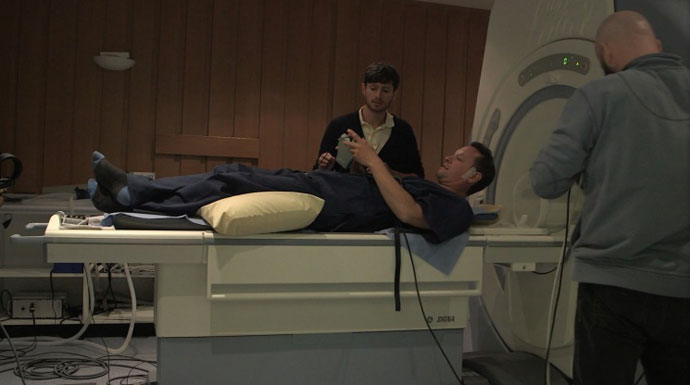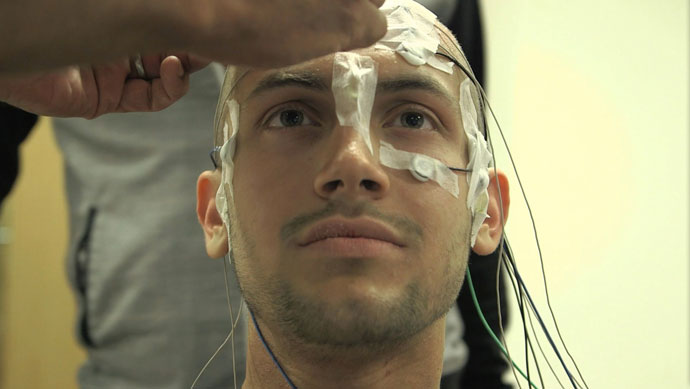LSD Researchers Are Crowdfunding The World’s First Imaging Study Of The Brain On Acid
Researchers in England — at the Beckley Foundation’s Psychedelic Research Programme, to be exact — are using crowdfunding in order to conduct a study involving the world’s first images of the brain on acid.
Although most readers are undoubtedly familiar with the CIA’s MKUltra experiments in the 1950s and ‘60s, those experiments never actually studied the effects on the brain (especially since, as Motherboard points out, MRI machines didn’t even exist in the 1960s). Since then, the taboo around psychedelics has been strong; in both the U.S. and U.K., LSD is a Schedule-1 drug, which means it’s a controlled substances and requires many licenses if anyone wishes to study it. As a consequence, there is very little research on psychedelics.
The Beckley Foundation aims to change that. Using Walacea, a U.K.-based crowdfunding platform for scientific research, the foundation has raised over £44,000 of its original £25,000 goal and is now working toward a £50,000 stretch goal in order to conduct imaging studies of the effects of LSD on the brain.
For the study, a carefully screened slate of volunteers is given clinical-quality LSD in a controlled research environment; the foundation says that the risks are minimal, as persistent flashbacks “are very rare in recreational users and the phenomenon has been widely exaggerated.” The brain is then imaged with fMRI and MEG scanners in the hopes that the researchers will discover how LSD affects the brain, including what specific areas it works on.
Roadblocks to Research
The psychedelic research is being conducted by Professor David Nutt and Dr. Robin Carhart-Harris of Imperial College London, along with the Beckley Foundation, founded and directed by Amanda Feilding. The researchers received a special license from the Home Office to administer LSD and were given a favorable opinion from an ethics committee in order to carry out research on human subjects, according to the foundation’s Walacea page, but getting there was something of a struggle, as well as a labor of love for Feilding.
“We are far from the ideal conditions to develop scientific research on psychedelics,” she told Wall Street Insanity. “There is a myriad of obstacles facing those who are determined to do it, mostly related to the substances’ scheduling: Hefty licenses, bureaucratic procedures, scarce funding, limited or non-existing legal supply, etc. But not all hindrances are strictly material; it is not unlikely for auspicious results to be received with unwarranted skepticism or mistrust, for instance. These are all vestiges of the crumbling edifice of Prohibition which, by waging a war on drugs, effectively declared war on knowledge.
However, Feilding says that this is changing. “Studies on psychedelics like ours are multiplying in different parts of the world and popular support is strong, as demonstrated by our successful crowdfunding campaign to finish and extend the first brain-imaging study on LSD.”
Why LSD?
When asked why she decided to focus on LSD specifically, Feilding told Wall Street Insanity that there were three reasons.
“One is personal, as I was introduced to LSD during the 1960s, before the policies of prohibition targeted the substance,” she says. “I was puzzled by the capacity that the substance had to initiate non-ordinary states of consciousness, including mystical experiences that are subjectively similar to those experienced through meditation, or during religious ecstasy. Having studied comparative religions and mysticism at Oxford, this was a major discovery. I have tried to shed light on this relationship and its physiological underpinnings ever since.”
Another reason was her professional involvement with drug policy reform. “I created the Foundation to encourage the emergence of drug policies that are based on scientific evidence, not on ideology or political expediency,” she says. “The prohibition regime to which psychedelics are subjected epitomizes what is wrong with the current approach. These substances are among the least likely to cause harm, and yet they are the most strictly restricted. It is not rational. For the last 16 years, the Beckley Foundation has been instrumental in the development of an international debate on these topics, with pioneering scientific studies and rigorous policy reports that we co-design and carry out with experts in leading academic institutions.
Last, but not least, psychedelics are fascinating substances from a therapeutic point of view. The more we know about them, the more it confirms my view that, used responsibly and with respect, they can be transformative and healing.”
The researchers hope the images might offer some clues as to the way LSD could work to heal conditions like obsessive compulsive disorder, alcohol dependence, depression, anxiety and more. The foundation says it has had many volunteers for the study — often people who have had positive experiences with psychedelics in the past.

Image via Beckley Foundation’s Psychedelic Research Programme
In fact, Feilding says that the foundation’s experience with finding volunteers hasn’t been as difficult as people might expect.
We have had an overwhelmingly positive response in this regard, with a great deal of people contacting us to participate in the research as volunteers… However, our studies have been limited in numbers and our screening process is very strict, so only a few dozen have actually been tested with psychedelics.”
Unlocking the Therapeutic Benefits of Acid
According to Feilding, most of the foundation’s research on psychedelics up until now has focused on the “neural underpinnings of the subjective effects of classic psychedelics.”
So how much is already known about LSD, and what further research needs to be done to determine the drug’s full potential? Fielding says that the foundation’s research has discovered that psychedelics reduce activity in the default mode network (DMN) and other parts of the brain.
This effect explains the changing state of consciousness: Cognition becomes more unconstrained, freer, more ‘primal.’ This informs the treatment of debilitating mental conditions in which the person has integrated negative thought patterns that have become rigid. By precipitating freer thinking, psychedelics such as psilocybin help loosen these negative thought structures. This mechanism could be the key to the therapeutic use of psychedelics and could be useful in the treatment of substance dependence, obesity, anorexia, obsessive compulsive disorder and anxiety,” says Feilding.
When asked what kind of therapeutic benefits LSD could offer, she lists a variety of conditions that might be treated with psychedelic drugs.
We have collaborated with Johns Hopkins University in a very successful study on psilocybin-assisted psychotherapy to treat tobacco dependence, we are currently working with Imperial College [London] on psilocybin and depression (partly thanks to a grant by the MRC) and we are developing a study on the use of LSD in the treatment of alcohol dependence. We are also devising research on ayahuasca and DMT, also psychedelic drugs.”
The Reality of LSD-Based Treatments
Feilding can’t make any firm predictions about exactly when LSD-based treatments might be seen by the general public, but she seems confident that they’ll exist in the near future.
LSD-assisted psychotherapy is definitely an attainable goal, and pilot studies suggest it is also a desirable one,” she says. “I am optimistic, but I also realize the obstacles are exceptional… It seems progressively likely that this form of treatment could become a reality as soon as the next 10 years, but forecasts are tricky when one deals with institutionalized censorship.”
In the meantime, Feilding plans to continue working to bring about policy change and raise funding for research into psychedelics.
Although this research project initially faced an “uphill struggle” due to the difficulty of raising funds and overcoming regulations related to psychedelics, the Beckley Foundation has seen “overwhelming support” in its crowdfunding campaign, according to Natalie Jonk, the founder of Walacea.
“The overwhelming support that this project has had shows the role the public can have in democratizing science… We are delighted that our model is showing promise for engaging the public in research and giving them the opportunity to support science that they would like to make happen,” Jonk stated in a recent press release.
As for Feilding, she believes firmly in the potential of LSD, saying, “I am still as marveled and passionate about the topic as I was 50 years ago.”








































